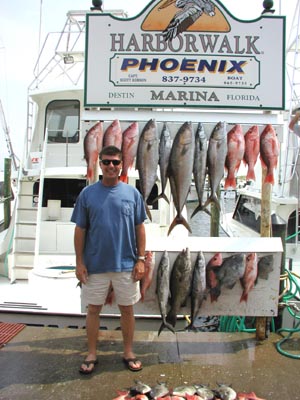|
|
The
World's Luckiest Fishing Village or Fishing Mecca? |
|
|
The
World's Luckiest Fishing Village or Fishing Mecca? |
"The World’s Luckiest Fishing Village or Fishing Mecca?" – growth of the fishing industry shapes Destin’s future
Riding on a 58-year streak of luck the fishing industry in the "World’s Luckiest Fishing Village" of Destin has consistently fed the economic core of this city and the tourist industry of the region, an impact that may even lead to a re-shaping of its identity from a "village" to a "mecca."
According to estimates in a 2000 study by the University of West Florida’s Haas Center for Business Research and Economic Development, Destin’s charter fishing industry injects approximately $175 million in direct spending to the local economy and supports 7,242 jobs either directly or indirectly. These numbers represent a significant portion of Florida’s $5.5 billion fishing industry and the 75,000 jobs statewide that the industry supports. In fact, the Destin Charter boat industry is the largest charter boat operation in the entire Gulf Coast according to Scott Robson, Captain of the Phoenix charter vessel and President of the 90-member, Destin Charter Boat Association.
The association protects the interests of an industry that is a core economic pillar with trickle-down effects. According to the Haas study, the majority of the economic impact of the charter fishing industry comers from the spending of tourists who are attracted to the area by the fishing industry. Tourist spending on lodging, restaurants, transportation, retail merchandise, entertainment, and other goods and services results in an overall economic activity totaling approximately $317 million and supports approximately 6,775 jobs in the area. Tourism spending represents 90.8% of the total economic activity that is generated by the fishing industry and 93.5% of the jobs that the industry supports according to the Haas study.
Destin’s fishing industry traces its early origin back to Capt. Leonard Destin, who settled here in northwest Florida around 1845 and pioneered the fishing industry. But the fishing spot is not Capt. Destin's secret anymore as thousands of sport-fishing aficionados converge from all over the world to enjoy moderate sea breezes and sunny skies as they fish the local waters for cobia, red snapper, dolphin, grouper, pompano, flounder, red drum, speckled trout, mackerel, amberjack, ladyfish, tarpon, blue marlin, and sheepshead.
 |
Robson has operated charters for 25 years and is optimistic about the season and the future. While the economic picture for the fishing industry appears healthy the association is contending with issues that may affect its future. One of those issues is the fishing management practice of establishing "marine protection areas" which restrict fishing. "They are areas closed to recreational fishing," according to Robson. This practice is intended to restore fish stocks in certain species; however, Robson thinks it isn’t necessary in many cases. "Before you ever close off an area look at changing the quotas. We’re all for fishing restrictions, I don’t need 5 groupers per person," he notes. "They have done this in California & Mexico, it’s on the horizon," he warns. As the industry continues to drive the economic engine of the area it is beginning to shed its "fishing village" character for a much more contemporary character. The city hired Scarborough Consulting to help it give its image a facelift. In a interview with the Destin Log, city councilor Sam Seevers acknowledged support for the fishing industry but added, "We’re not a fishing village any more, we want something more upbeat and modern. We’re moving the city forward by leaps and bounds." Others on the council with a local fishing ancestry are hesitant to step too far away from the city’s fishing culture but recognize that the "village" moniker is passe˘ . In yet acknowledgment of its shedding the "village" character the city is contemplating the funding and hiring of a harbormaster to help address better enforcement of pollution laws in the wake of the discovery of high fecal coliform counts resulting from the unlawful discharge of holding tanks. Destin City Mayor, Craig Barker, is rigorously protecting the city’s maritime economy and has held a series of workshops to deal with pollution. "The Destin charter and commercial fishing fleet and our working harbor is our lifeblood," Barker states, "it is what sets Destin apart from all other coastal communities." |
Recognizing Destin’s early fishing culture and economic impact, Developer Peter Bos [Profiled in Sept – Oct 2002 issue] of Legendary Inc. is building his HarborWalk Village concept around the city’s fishing culture. HarborWalk will be built at the foot of the Destin Bridge Plans with plans to have historical fishing memorabilia to be displayed in the development. "Fishing is very vital to the growth of the city and to sustain what we have with HarborWalk Village," Bos notes.
As long as there are fish to be caught in the Gulf of Mexico and Choctawhatchee Bay the city’s fishing heritage will continue to grow. "The fishing fleet’s existence is a timeless reminder of our founding father’s proud heritage from which our community was born," notes Barker. "Their heritage and their values must always be remembered and cherished, and, in my opinion, we must do everything in our power to foster the essence of a working maritime environment for all the citizens of Destin and our visitors to enjoy."
| Scott Jackson Mindlace Media Mindlace.com 850-217-7994 |
© 2003 Scott Jackson